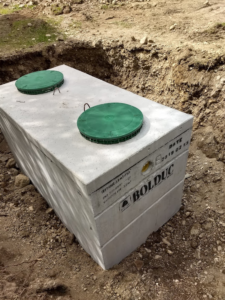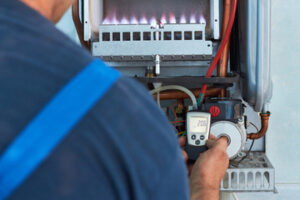Many homes in rural areas have septic systems. They may seem intimidating, but they work great – with regular inspections and proper maintenance.
A septic tank is a buried watertight container that holds wastewater. Solid waste sinks to the bottom, forming sludge, while oil and grease floats to the top as scum. The liquid wastewater (effluent) exits the septic tank and goes into the drain field area. Contact Septic Tank Armadale now!

The septic tank in a septic system is a large, hidden underground vessel that holds sewage waste. It’s normally a rectangular or cylindrical structure made of fiberglass, polymers, concrete, or other weather-resistant material. A healthy population of anaerobic bacteria feeds on and digests organic matter inside the septic tank. This prevents the septic tank from overflowing prematurely and helps remove a number of contaminants from the wastewater. At one end of the septic tank is an inlet baffle that stops sludge and scum from leaving the septic tank. The other end has an outlet baffle that keeps septic tank effluent from seeping out into the drainfield too quickly. From the septic tank, effluent trickles through a network of perforated pipes that extend into the soil. This naturally filters the sewage through rocks, dirt, and sand, which removes impurities from the wastewater. Then, gravity forces the water back down into underground aquifers.
The first sign that a septic tank is nearing capacity is often a foul odor. When the level of waste gets too close to the inlet, gases start to seep out through the septic tank vent. Other warning signs include a toilet that won’t flush, drains that make gurgling sounds, or even a pool of water in the yard.
Putting non-biodegradable waste items down the toilet like cigarette butts, cotton buds/swabs, menstrual hygiene products and condoms can also cause septic tanks to clog or fill too quickly. The phosphates released by these materials can trigger prolific plant growth and even toxic algal blooms.
If you’re thinking about buying a property with a septic system, be sure to ask for inspection records and make your offer contingent on passing the septic system inspection. Most lenders will understand that a contingency like this will ensure you’re a serious buyer who’s ready to close on the property once all inspections have been completed.
A septic system that’s properly cared for can last 50 years or more. However, septic systems that aren’t maintained correctly can fail within 10 to 15 years. It’s crucial to get your septic system inspected regularly and pumped as necessary to help it stay in good condition for as long as possible.
How does a septic tank work?
A septic tank is a buried, watertight container made of concrete, fiberglass or polyethylene. It holds wastewater until bacteria inside break it down. Wastewater is deposited into the septic tank from household plumbing and toilets. Gray wastewater and black wastewater (feces and urine) separate in the tank, with solids sinking to the bottom to form sludge and oils and grease floating to the top. Bacteria inside the septic tank break down these solids in an anaerobic process. The remaining liquid is known as effluent. It flows from the septic tank into the drain field.
A septic system requires a lot of soil around the absorption or drain field to function properly. It’s important to keep plants and structures at least 8 to 12-inches away from the septic system pipes and septic tank. It’s also a good idea to add mulch (8 to 12 inches is ideal) around the septic system, drain field and the septic tank to help keep it healthy.
When it comes to septic tank maintenance, it’s best to hire a professional. A professional can do a thorough inspection, determine the size of your septic tank, and recommend the proper pumping schedule. They can also check for any clogs or leaks in the drain lines from your house to the septic tank and the septic tank to the drain field.
If your septic system isn’t working properly, you’ll notice sewage odors around your home and in your yard. These odors are caused by gases generated by the bacteria breaking down wastewater contaminants in your septic tank and releasing them into the atmosphere. The most common gas is hydrogen sulfide, which has a very foul smell, like rotten eggs. It’s important to have a septic system vent that prevents this from happening and keeps it safe for you and your family to live in your home.
A septic tank usually looks like a large metal box with inspection pipes and manhole covers on the sides or top. Most tanks have baffles in them to prevent the sludge from escaping and a lid on top to protect the waste from inclement weather and animals.
Why do I need to pump out my septic tank?
The amount of waste produced in a home can help determine how frequently a septic tank should be pumped. Larger homes with multiple bedrooms typically require a larger septic system and have to have the tank emptied more often. A well-maintained septic system can function without a hitch for years. But if you don’t have it pumped at the recommended intervals, then your septic tank may overflow or leak, leading to sewage backup in your home.
It is not a good idea to try to clean or empty your septic tank on your own. It is difficult and time-consuming, plus you need to have all the proper tools. Hiring a professional to do the job ensures it is done correctly. A professional can also tell you tips for keeping your septic system in good working condition for as long as possible.
One of the most important reasons to get your septic tank pumped is to prevent clogs in the house drains and toilets. Solid materials in a septic tank sink to the bottom and form sludge while fats, oils, and grease float to the top and form scum. Anaerobic bacteria in the septic tank digest these organic wastewater pollutants, leaving liquid sewage that passes through an effluent filter and into a perforated drain field.
Besides human waste (blackwater) and household soaps, detergents, and water, nothing should go into the septic system that does not belong there. This includes:
• Cigarettes, left-over medications, baby wipes, cleaning wipes, feminine hygiene products, kitty litter, paper towels, tissues, and other solid wastes. • Chemicals like paint, varnish, solvents, and oil, pesticides, antifreeze, and other household chemicals. Find a hazardous waste drop-off site in your area.
It is also a good idea to get your septic tank pumped before hosting a big family gathering or party. The more people that enter the home, the higher the volume of wastewater going into the septic system. This can overload the septic tank, causing it to overflow and contaminate the surrounding soil. It’s better to have the tank pumped before the event to avoid expensive repairs or messy sewage back-up in your home.
What is a drain field?
Often referred to as an absorption field or leach field, the drain field is where wastewater undergoes major treatment and purification. It is the last step in the septic tank system before effluent enters groundwater and surface water. Basically, the drain field is an area of perforated pipes that allow the wastewater to sieve through soil and be absorbed into the groundwater. The piping network in the drain field is designed to work well with the soil conditions at the site, and a percolation test is usually required to determine the appropriate design.
The septic tank and drain field are usually placed underground so they don’t become damaged by floodwater, heavy vehicles or animals. The drain field is typically surrounded by gravel for protection and to reduce the amount of wastewater that seeps out into the surrounding soil. The gravel also prevents the septic system from being covered by vegetation, which can cause obstructions and delay the process of purification.
The drain field consists of a network of downward-sloped, perforated pipes that are usually buried under a layer of gravel. These pipes allow the septic system to process and dispense wastewater over time as the soil slowly absorbs it.
In the drain field, aerobic bacteria perform the majority of the wastewater treatment process before it disperses into the groundwater. The bacterial action also helps to remove the impurities in the wastewater, which are eventually eliminated through uptake by plants, transpiration, and evaporation into the air or groundwater.
A septic tank drain field should never be used for other purposes, such as parking bu,ilding structures, or playing on the soil. This can compact and damage the soil, which may interfere with the effluent flow. Additionally, the drain field should be kept free from debris and solids that can clog pipes and disrupt the microbiological process. Solids include food, baby and wet wipes, dental floss, medications, cigarette butts and ashes, fats, oils and grease, hair, napkins, paper towels, and other non-biodegradable waste.
If you notice a foul odor in the yard, wet or soggy spots on your property, slow-to-drain sinks, toilets that overflow and sewage backing up into the home, contact a professional immediately. They will investigate and, if needed, repair the drain field.

